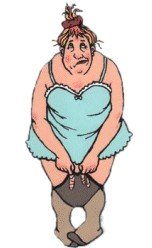|
Dieting & Obesity

Dieting has a powerful enemy – self discipline. It is largely because of a lack of self discipline (or will power) that many diets fail to produce results. A major cause of obesity is the mindset that overeating and over drinking is okay. Stick with us for a simple workable solution…..it’s free!
Do some people metabolise their food faster and can get away with over indulging? Some studies have proven this to be a myth. Sadly, every mouthful we eat goes straight to the hips or belly if we overindulge ourselves. It is not fair, but that's how it is. So we must compensate. We are often judged by how we look. Sad but true. Fat looks gross and causes severe health problems not to mention the psychological impact of being obese. But you already know that. Overfeeding ones family is irresponsible. Your love and care in providing big meals is not doing them any favours. It is entrenching bad habits. The best diet (this one) costs nothing. In fact is saves money for the new fashionable wardrobe you will need when the fat slips from your belly and hips from following our logical diet. So, start by slashing your weekly grocery and food budget. If you don't have it you can't eat it. This diet is not for the mentally unhealthy or faint-hearted. If you are determined to lose weight and keep it off, read on... Dieting has been defined as a controlled intake of food and drink designed for weight loss, for health or other reasons, or to control or improve a medical condition. ‘Controlled intake of food and drink’ are the key words. We are suffering from Portion Distortion.
In more general terms it refers to the persistent consumption of excess food in relation to the energy that the person expends, leading to weight gain and often to obesity. This may be a brief or short term process or a longer term process (many people overindulge generally during festivities or while on holiday)' We repeat the crux of the problem - ‘persistent consumption of excess food in relation to the energy that the person expends, leading to weight gain and often to obesity.’ The human body is so efficient that it does not need a lot of food for it to function. Consequently, it is very easy to overfeed it and the surplus gets stored as fat.
Actually, dieting simply relates to the amount of energy you eat versus what you expend through daily living. It's as simple as that. No escaping the facts. Here then is the ‘secret’ – eat and drink less. Resolve NOW to serve yourself to half or three-quarters of the quantity you have been indulging in previously. Use a smaller plate or bowl to eat from. A stomach bloated with food and drink works hard to quickly metabolize the contents and as a result we feel hungry again quite soon. It also gives us a huge gut. A stomach less full does not work as hard and we do not feel hungry again quite as soon. Good, eh? Think of those less fortunate than yourself who have no such luxury of indulgence. Say this affirmation over and over, 'I have the will to reduce my food and drink intake.’ By regularly eating less, the size of the stomach gradually shrinks so that the less you eat the less you need to eat to feel satisfied. Eventually; no guts, more glory! Now isn’t that something to strive for? Think back to how long it took of steady overconsumption of food or drink or consuming the wrong type of food to get to your present size. Now we aim to undo it by steady underconsuming. So, whatever you eat must be nutritious to avoid becoming undernourished. We don't want that to happen now, do we? Start by keeping a written record of your weight NOW and at regular daily or weekly intervals. Never lose this record. It must show your weight alongside the date. Do not allow your weight to EVER exceed your first recorded weigh-in. Keep reducing the quantity that you eat and drink at weekly intervals until you consistently achieve your weekly weight-loss target. When you reach your ideal weight fine tune your food intake to maintain that weight. Make food regulation a life long habit.
Add our web address to your ‘Favourites’ in your web browser and refer to it frequently. It would also help to print out copies of this page; pin one up on your pantry door and another prominently in your toilet/bathroom. Don't laugh at the idea. It will get your undivided attention regularly. Exercise by doubling or trebling your physical activity. This is not a substitute for eating less. Exercise is your most powerful ally. Exercise triggers the production of endorphins. Endorphins give us a feeling of exhilaration which reduces the need to find solace in eating. Walking on a treadmill is good for the waistline. Swimming is even better than walking for burning fat. Do both. In fact, any kind of activity will work off the kilos. Just keep moving. Drink plenty of water. Drink a glass of water before your meal to fill your stomach. Better still, add the water to the meal and puree it if that is possible. Change the meal into a soup! That will retain its bulk in the stomach longer so that you don't feel hungry too soon. Eat slowly. Savour each mouthful. It takes 20 minutes for your stomach to register that it's had enough. Eat less fat, salt and sugar. Always read the labels on your grocery products and select low fat, low salt, low sugar products. Your diet must include dairy products (preferably low fat) to help you excrete more fat. Do NOT skip meals, especially breakfast or you will be tempted to make up for it later. Protein in your diet will help stave off hunger pangs. The fewer your choice of dishes the less you are likely to eat. So avoid smorgasboards (buffet meals) when eating out. Resist the temptation to snack between meals then bask in your achievement. Know that your hunger pangs are burning fat and shrinking your belly. Get enough sleep. Sleep deprived people tend to eat more, are sluggish and less mentally alert. Eat sensible, nutritious food. Get to know about calories and nutrition. Use this handy
Interactive Menu Planner.
Affirm, ‘I have the will to reduce my food and drink intake.’ Say this repeatedly every day. You do not have to believe it. You do not have to say it out loud. It will work regardless, but, would work better if you do believe it and say it out loud before a mirror. Weigh yourself before commencing the diet, and regularly thereafter. Keep a written record of each weigh-in. Set yourself a small achievable weekly weight-loss target of, say, one pound (half a kilogram) a week . Beat yourself up if you do not achieve YOUR target – after all it’s achievable AND small (smile). Congratulations if your weight is heading in the right direction. Don’t back off now. Remember that it's better to go slow and steady in the right direction, rather than full speed in the wrong direction. Your ultimate target weight should be in the range of 19 to 25 of the BMI (Body Mass Index). This excellent website of the Department of Health and Human Services will calculate it for you in a micro-second if you enter your height and weight (also measure your waist circumference if you want to take your health a step further). Aspiring to develop a six-pack flat stomach? Work on your tummy exercises. But you will see results only AFTER you shed those unsightly kilos around your middle by reducing your food intake. It goes without saying: All diets and exercise must be compatible with your age and medical condition. Seeking professional advice is strongly urged before you commence any diet to prevent any unwelcome consequences.
If our free diet does work for you – use our
Do it anyway, start some healthy competition, encourage each other to stick with it and then tell us how you went.
If you have a few horror stories be sure to let it all out on our
Rage Page - Dieting And finally, as a footnote: Diabetes Australia warns... A unique way to save money and your figure It's a fact – Australians are getting fatter. Lack of exercise is part of the problem but so is excessive eating – and eating too much means we're spending too much. You could improve your net worth (and reduce your net girth) by just changing your eating habits. We can't do much about the price of petrol, the direction of the share market or the rate of inflation but we can control how we spend our money. A quick check in the bathroom mirror after a shower could show where a lot of your spending goes!
It's not just the quantity - but also the content of the food we eat. Did you know the most consumed vegetable is the humble potato, as chips? Or a can of lemonade has 26 teaspoons of sugar in it? No wonder our waistlines are expanding! From a personal finance point of view, if we are eating too much, then we are spending too much. Typically, we spend about $5,000 a year each on food. If we could be less wasteful and more selective we might save 10% of this cost. This saving could be used to reduce debt, invest or enjoy life. For instance, taking your lunch to work instead of buying out can save money. It's cheaper to make your own lunch, and prepared food includes GST (Goods and Services Tax) whereas fresh food is GST-free. The costs of eating too much goes beyond the grocery bill. Being overweight has many other costs. - You run a greater risk of health problems including high blood pressure, heart disease, diabetes and back problems. As we get older, our knee, hip and ankle joints start to wear out because they weren't designed to cope with the extra weight. - You may need bigger clothes and find fewer choices available in your size. - You may face higher premiums for disability and life insurance. - You may spend money on dietary supplements (often ineffective) or exercise equipment and gym membership (often underused). - You may be tempted into costly plastic surgery such as liposuction, tummy tucks, jowl drains and arm de-flabulation! Social eating and drinking are part of our society and lifestyle – they provide one of life's real pleasures. But do you eat more (and spend more) than is necessary or healthy? How much food gets thrown away? Do you need to eat out or take-away, when you could have made the meal yourself? Money and food have a lot in common. When discussing either topic we talk about "consumers" – and over-consumption isn't healthy on either front. Sadly, we often think of budgets and diets in the same way - boring and easy to avoid - but changing your eating habits can make a big difference to your bottom … line!
|




